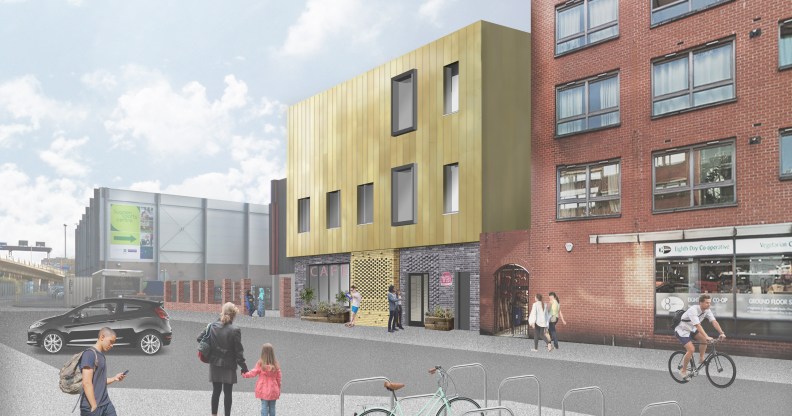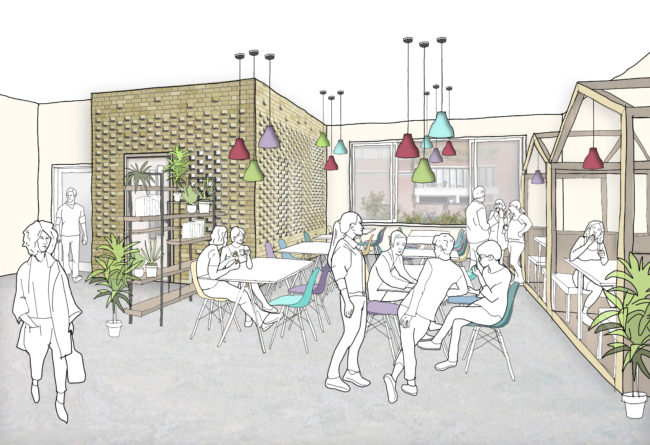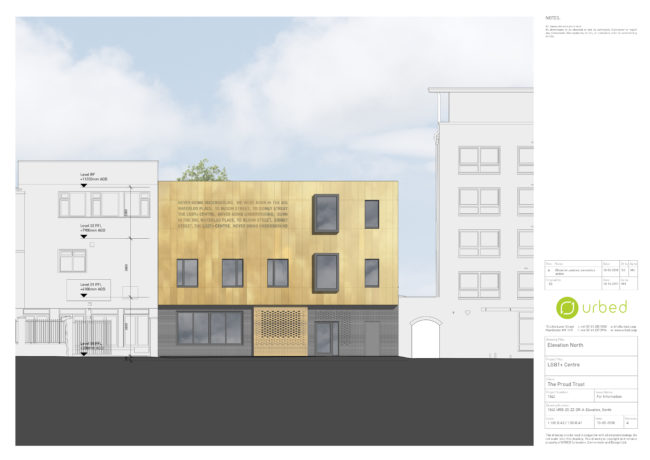UK’s only purpose-built LGBT centre gets £450,000 boost for rebuild

A CGI showing the proposed design of Manchester’s new LGBT+ centre. (The Proud Trust)
Youth organisation The Proud Trust has received a £450,000 donation from the Greater Manchester Combined Authority to rebuild its LGBT+ centre—the only purpose-built LGBT+ centre in the UK.
The Proud Trust is raising £2.25 million towards rebuilding The LGBT+ Centre on Sidney Street, Manchester, which is being billed as the “UK’s largest LGBT+ capital project.”
The plans involve knocking down the existing building, which is in a state of disrepair, and replacing it with a three-storey LGBT+ centre, tripling the size of the space.
Manchester’s new LGBT+ Centre is UK’s “largest LGBT+ capital project”
The latest funding boost from the Greater Manchester Combined Authority means that The Proud Trust has £150,000 remaining left to raise to reach its £2.25 million goal.
It comes after a £250,000 grant from Manchester City Council, alongside a £800,000 grant from the Big Lottery Fund.
The Proud Trust describes The LGBT+ Centre, which opened in 1988, as the first “fully publicly funded ‘gay centre'” to be built in Europe.
Ali Hanbury, manager of The LGBT+ Centre, told PinkNews that the new building would support 50,000 LGBT+ people in the Greater Manchester area, an increase from the 20,000 queer individuals it currently serves annually.
Hanbury said the centre would “ensure LGBT+ young people have the same opportunities and life chances as their heterosexual and cisgender counterparts.”
“The Proud Trust save and enhance the lives of thousands of LGBT+ people each year and the new building will help us to continue this vital work.”
—Ali Hanbury, manager of The LGBT+ Centre
Hanbury added that the rebuilt LGBT+ centre will also provide a “gender-identity service” for those aged below 25, and increase the available support groups from 18 to 30.
“The Proud Trust save and enhance the lives of thousands of LGBT+ people each year and the new building will help us to continue this vital work,” continued Hanbury.
Provided the funding target is reached, construction work on the new LGBT+ centre is set to start this summer, with a completion date scheduled for 2021 or 2022.
The current plans for the centre were drawn up by Manchester-based urban design co-operative URBED.

The proposed design of the cafe at Manchester’s new LGBT+ centre. (The Proud Trust/URBED)
Carl Austin-Behan, LGBT advisor to the Mayor of Greater Manchester, told PinkNews that the new centre would provide a safe place for Greater Manchester’s LGBT+ community.
“I’m really proud that this proposal has been brought forward and now The Proud Trust can now get to work and start with the rebuild,” he said.
Austin-Behan, who became the first openly gay Lord Mayor of Manchester when he took the role from May 2016 to May 2017, added: “The centre will be a vibrant hub, [increasing] the space they currently have, providing a safe environment and help continue to support the next generation of LGBT+ young people across Greater Manchester.”
New LGBT+ Centre in Manchester will support LGBT+ community for generations to come, says councillor
Manchester City councillor Bev Craig, lead member for LGBT Women, told PinkNews that the project would support the city’s LGBT+ community for decades to come.
“Manchester has always been at the forefront of the fight for LGBT+ rights and I’m proud that our city region is continuing our long standing commitment to our diverse LGBT+ communities in the region,” she said.

A drawing of Manchester’s new LGBT+ centre. (The Proud Trust/URBED)
Craig added that the new centre would “provide support for generations of LGBT+ young people to come.”
David Farley, network coordinator at the Greater Manchester LGBT Social Support Network, told PinkNews that the group also supported the plans for a new LGBT+ centre in the city.
“Various discussions across the city of Manchester have expressed a need for somewhere safe for LGBTQ+ people of all ages to go for support or just to be themselves, free from stigma and judgement or stereotype,” Farley said.
“There remains hope that something that would fulfil this need is in progress or development in the near future.”

